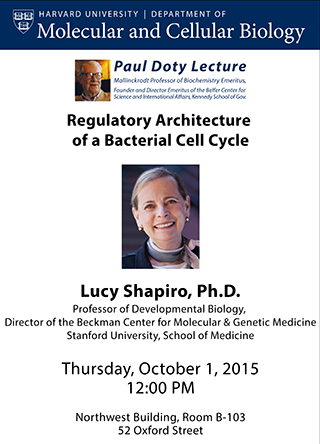The Doty Lecture is presented annually to celebrate the scientific and public policy achievements of Professor Paul Doty, founder of both the Department of Biochemistry and Molecular Biology (currently, Molecular and Cellular Biology) and the Belfer Center for Science and International Affairs at Harvard University. Prof. Lucy Shaprio will present her lecture, titled “Regulatory Architecture of a Bacterial Cell Cycle” at 12 pm in room B-103 of the Northwest Building.
Dr. Shapiro is a professor in the Department of Developmental Biology and Ludwig Professor of Cancer Research at the Stanford University School of Medicine. She is also the director of Stanford’s Beckman Center for Molecular and Genetic Medicine. Dr. Shapiro’s lab has focused on studying Caulobacter cresentus, one of the simplest organisms that divides asymmetrically into different cell types, to uncover fundamental principles of developmental biology. Using this model system, Dr. Shapiro has elucidated the signaling circuits that control cellular decision making and regulate the bacterial cell cycle. Her work has also helped us understand DNA segregation, cell growth and division, and asymmetric development. These studies pioneered our understanding of organization within bacteria, showing that spatial localization is essential to biological processes even in the simplest organisms. Her lab has trained many scientists, twenty of whom now run their own independent labs, and many are leaders in their field.
Dr. Shapiro is also involved in policy work, having advised both the Clinton administration and the second Bush administration on topics such as the development of antibiotic resistance and the spread of bacteria into previously unexposed populations. She belongs to the Center for International Security and Cooperation at the Freeman Spogli Institute for International Studies at Stanford University. Her many honors include FASEB’s Excellence in Science Award, the National medial of science, the ASCB Women in Cell Biology Lifetime Achievement Award, and election to the National Academy of Sciences, the Institute of Medicine, and the American Academy of Arts and Sciences.
Dr. Shapiro received an A.B. in fine arts in 1962 from Brooklyn College followed by a Ph.D. in molecular biology from the Albert Einstein College of Medicine in 1966. She was briefly a postdoctoral fellow at Albert Einstein, until she became faculty at Einstein in 1967. She moved to Columbia in 1986 as the Chair of the Department of Microbiology at Columbia. In 1989, she moved to Stanford to be the Founder and Chair Department of Developmental biology, where she still is professor. She later became the director of the Beckman Center for Molecular and Genetic Medicine in 2001.
Paul Doty was the Mallinckrodt Professor of Biochemistry Emeritus and also Director, Emeritus, of the Belfer Center for Science and International Affairs, which he founded at the John F. Kennedy School of Government in 1974. As a biochemist, Doty elucidated the structure and function of large molecules, ranging from the polymers in plastics and fibers, to polypeptides and polynucleotides. He is perhaps best known for demonstrating the denaturation of the double-stranded DNA molecule and its reuniting through hybridization; this technique was key to the era of recombinant DNA research. After retirement he passed away on December 5, 2011.
As an advocate for arms control, Doty led and participated in many initiatives to bring Russian and American scientists together in pursuit of international security, making more than 40 trips to the Soviet Union. He was a member of the President’s Science Advisory Committee (PSAC) during the Kennedy Administration. After retirement, he continued working in this area, for example serving as board member of Soros’ International Science Foundation that provided critical research support to Russian scientists in the 1990s.
Read more on Paul Doty in Science Retrospective


